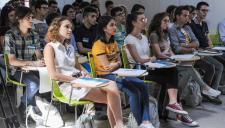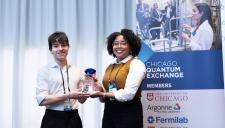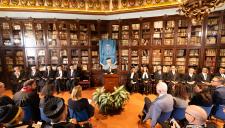For EELISA “Stage 2”, from 2023 to 2027, the European Union has allocated over 14 million euro to be shared among 10 universities from 8 EU countries: of this sum, 1 million goes to the Scuola Normale and 1 million to the Scuola Superiore Sant’Anna. From Wednesday 4th to Friday 6th October in Bucharest, the first conference for reporting on the results obtained and for planning the future
PISA, 3 October. Over 194,000 students, 18,500 lecturers, 12,000 team members in 10 universities from 8 European countries: these numbers will give you an idea of the extent of the European Engineering Learning Innovation and Science Alliance, (EELISA) which at the end of October 2023 will celebrate its third anniversary, and which, for Italy, is represented by the Scuola Normale Superiore and the Scuola Superiore Sant'Anna of Pisa. At the end of its first three years, this alliance is ready to double and intensify its activities: EELISA has been selected in the “Erasmus+ European Universities 2023” call, obtaining funding of 14 million 400 thousand euro for the four-year period 2023-2027, one million euro of which has been allocated to the Scuola Normale Superiore and one million to the Scuola Superiore Sant'Anna.
With the motto “becoming the engine that leads to a new future"” and with the purpose of sharing results, with a report on the impact created in this learning curve, EELISA has promoted its first international conference, running from Wednesday 4th to Friday 6th October at the National Polytechnic University of Science and Technology of Bucharest, Romania (PRESS CONFERENCE).
Taking part in the conference will be representatives of the 10 universities making up the alliance – including the Scuola Normale and the Scuola Superiore Sant’Anna – that have played an active role in the construction of EELISA over the last three years: members of the government authorities and operational teams, students, lecturers, team personnel and external collaborators, as well as all those who, in their various roles, have declared their willingness to take part in the journey, defined by its promoters as “pioneering”, in the years to come. The conference programme includes round tables, practical workshops, open dialogues, special presentations, exhibitions and numerous other activities aimed at strengthening co-operation and at developing the shared understanding of the context and the prospects opening up for the next three years of this alliance.
The objective of EELISA ”Stage 2” is to transform European higher education by strengthening the links between engineering and society and promoting a new model of European engineer ready to contribute to the global challenges with intelligent and sustainable solutions. The Scuola Normale participates with its expertise in the sciences (physics, mathematics, chemistry and biology) and in nanotechnology, but also with its historical, literary, philosophical, economic and ethical studies, to provide its students with the opportunity to enhance connections and collaborations with important European universities and research centres.
The Scuola Superiore Sant’Anna will be participating with its expertise in the experimental sciences (industrial and informatics engineering, medicine, agriculture and plant biotechnologies) and the social sciences (economics, management, juridical sciences and political sciences), in a context open to new collaborations uniting training, research and third mission, contributing to the training of the next generation of brilliant professionals capable of leading a sustainable change in a multidisciplinary, diversified, multilingual and global context, influencing European values.
According to the “CEDEFOP Skills Forecast”, the estimated additional requirement for professionals in science and engineering between 2021 and 2030 will be 1 million for the entire European Union, with increasingly transversal skills. In this second three-year period, EELISA will be searching for the “legal entity” most appropriate for its mission and vision, by creating accredited first- and second-level degree and PhD joint programmes, in order to strengthen the interdisciplinary nature of university courses. In addition, it will be aiming to strengthen collaborations in line with the six dimensions of the European Education Area: quality, inclusion and gender equality, green and digital transition, teachers and trainers, higher education, and geopolitical dimension.











